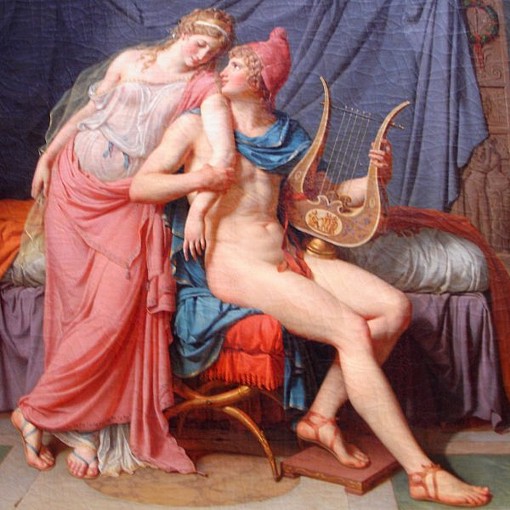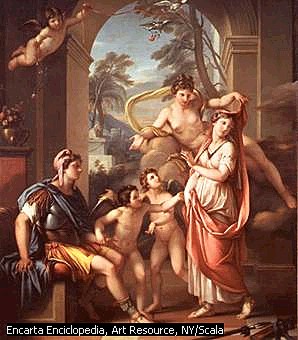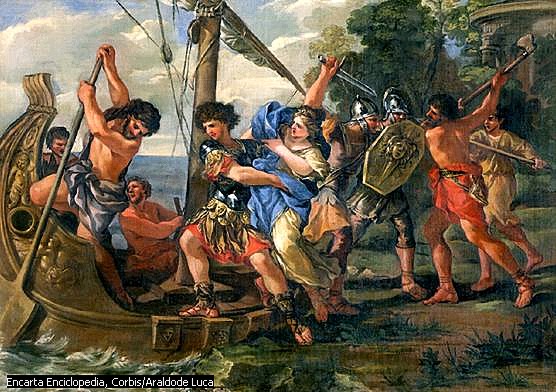Lessico
Elena

Les
Amours de Pâris et d'Hélène
Jacques-Louis
David (1748-1825) - dettaglio – 1788
Louvre - Parigi
Figlia di Zeus![]() ,
o di Tindaro, e di Leda
,
o di Tindaro, e di Leda![]() ,
era considerata la più bella donna della Grecia. Secondo la leggenda, era
nata da uno delle due uova che Leda aveva partorito, insieme a Polluce, mentre
dall’altro uovo erano nati Clitennestra e Castore. Giovanissima fu rapita da
Teseo, ma poi liberata da Castore e Polluce.
,
era considerata la più bella donna della Grecia. Secondo la leggenda, era
nata da uno delle due uova che Leda aveva partorito, insieme a Polluce, mentre
dall’altro uovo erano nati Clitennestra e Castore. Giovanissima fu rapita da
Teseo, ma poi liberata da Castore e Polluce.

Vera presenta Elena a Paride - Hamilton
Il pittore scozzese Gavin Hamilton (Murdieston House, Lanarkshire, 1723 - Roma 1798) attivo nella seconda metà del XVIII secolo, lavorò per molto tempo a Roma, dove prese parte alla decorazione del casino di Villa Borghese. Le sue opere più note si ispirano all'epica omerica, come questo Vera presenta Elena a Paride, conservato al Museo di Roma.
Tutti i principi greci aspiravano alla sua mano, ma Elena scelse Menelao![]() ,
da cui ebbe una figlia, Ermione. Fu poi rapita dal principe troiano Paride e
questo ratto scatenò la guerra di tutti i Greci contro Troia
,
da cui ebbe una figlia, Ermione. Fu poi rapita dal principe troiano Paride e
questo ratto scatenò la guerra di tutti i Greci contro Troia![]() .
Alla morte di Paride ne sposò il fratello Deifobo.
.
Alla morte di Paride ne sposò il fratello Deifobo.

Il ratto di Elena - Romanelli
Il
dipinto è attribuito a Giovanni Francesco Romanelli
noto anche come
Raffaellino (Viterbo ca. 1610 - 1662).
Ma quando i Greci conquistarono Troia, Elena consegnò nelle loro mani il
marito. Tornò poi a Sparta![]() con Menelao, dove regnò fino alla morte di
quest’ultimo. Si ritirò quindi a Rodi, dove una congiunta, Polisso, la fece
impiccare.
con Menelao, dove regnò fino alla morte di
quest’ultimo. Si ritirò quindi a Rodi, dove una congiunta, Polisso, la fece
impiccare.
In Greek mythology, Helen (in Greek Heléne), better known as Helen of Sparta later Helen of Troy, was the daughter of Zeus and Leda, wife of King Menelaus of Sparta and sister of Castor, Polydeuces or Pollux and Clytemnestra. Her abduction by Paris brought about the Trojan War. Helen was described by Christopher Marlowe as having "the face that launched a thousand ships."
Etymology
Helen or Helene is probably derived from the Greek word, meaning "torch", or "corposant", or might be related to "selene", meaning "moon". If it has an Indo-European etymology, it is possibly a suffixed form of a root *wel- "to turn, roll" or "to cover, enclose" (compare Varuna, Veles), or of *sel- "to flow, run". The latter possibility would allow comparison to Vedic Sara?yu, who is abducted in RV 10.17.2, a parallel suggestive of a Proto-Indo-Asian abduction myth. The name is in any case unrelated to Hellenes, as is sometimes claimed ("Hellenes" being from the root *sed- "to sit, settle").
Birth
In most sources, including the Iliad and the Odyssey, Helen is the daughter of Zeus and Leda. Euripides' play Helen, written in the late 5th century BC, is the earliest source to report the most familiar account of Helen's birth: that Zeus, in the form of a swan, was chased by an eagle, and sought refuge with Leda. The swan gained her affection, and the two mated. Leda then produced an egg, from which Helen was born.
On the other hand, in the Cypria, one of the Cyclic Epics, Helen was the daughter of Zeus and the goddess Nemesis. The date of the Cypria is uncertain, but it is generally thought to preserve traditions that date back to at least the 7th century BC. In the Cypria, Nemesis did not wish to mate with Zeus. She therefore changed shape into various animals as she attempted to flee Zeus, finally becoming a goose. Zeus also transformed himself into a goose and mated with Nemesis, who produced an egg from which Helen was born. Presumably in the Cypria this egg was given to Leda; in the 5th century comedy Nemesis by Cratinus, Leda was told to sit on an egg so that it would hatch, and this is no doubt the egg that was produced by Nemesis. Asclepiades and Pseudo-Eratosthenes related a similar story, except that Zeus and Nemesis became swans instead of geese. Timothy Gantz has suggested that the tradition that Zeus came to Leda in the form of a swan derives from the version in which Zeus and Nemesis transformed into birds.
Abduction by Theseus
Two Athenians, Theseus and Pirithous, pledged to wed daughters of Zeus. Theseus chose Helen, and Pirithous vowed to marry Persephone, the wife of Hades. Theseus and Pirithous kidnapped Helen and left her with Theseus' mother, Aethra, while they travelled to the underworld, the domain of Hades, to kidnap Persephone. Hades pretended to offer them hospitality and set a feast. As soon as the pair sat down, snakes coiled around their feet and held them there. Helen was subsequently rescued by her brothers, Castor and Pollux, who returned her to Sparta.
In most accounts of this event, Helen was quite young; Hellanicus of Lesbos said she was seven years old and Diodorus makes her ten years old. On the other hand, Stesichorus said that Iphigeneia was the daughter of Theseus and Helen, which obviously implies that Helen was of childbearing age. In most sources, Iphigeneia is the daughter of Agamemnon and Clytemnestra, but Duris of Samos and other writers followed Stesichorus' account.
Marriage to Menelaus
When it was time for Helen to marry, many kings and princes from around the world came to seek her hand or sent emissaries to do so on their behalf. Several lists of her suitors were compiled, since the suitors of Helen were later the heroes of the Trojan War. This one is from Apollodorus:
Odysseus, son of Laertes
Diomedes, son of Tydeus
Antilochus, son of Nestor
Agapenor, son of Ancaeus
Sthenelus, son of Capaneus
Amphimachus, son of Cteatus
Thalpius, son of Eurytus
Meges, son of Phyleus
Amphilochus, son of Amphiaraus
Menestheus, son of Peteos
Schedius and Epistrophus, sons of Iphitus
Polyxenus, son of Agasthenes
Peneleos, son of Hippalcimus
Leitus, son of Alector
Ajax, son of Oileus
Ascalaphus and Ialmenus, sons of Ares
Elephenor, son of Chalcodon
Eumelus, son of Admetus
Polypoetes, son of Perithous
Leonteus, son of Coronus
Podalirius and Machaon, sons of Aesculapius
Philoctetes, son of Poeas
Eurypylus, son of Evaemon
Protesilaus, son of Iphiclus
Menelaus, son of Atreus
Ajax and Teucer, sons of Telamon
Patroclus, son of Menoetius
This list is not complete; Apollodorus earlier mentions Cinyras king of Cyprus and Enarophorus and later mentions Idomeneus, king of Crete. Another list was compiled by Hesiod and, later by Hyginus. All suitors brought many rich gifts with them, with the exception of Odysseus. Helen's father, Tyndareus, would not choose a suitor, or send any of the suitors away, for fear of offending them and giving grounds for a quarrel. Odysseus promised to solve the problem if Tyndareus would support him in his courting of Penelope, the daughter of Icarus. Tyndareus readily agreed and Odysseus proposed that, before the decision was made, all the suitors should swear a most solemn oath to defend the chosen husband against whoever should quarrel with him. This stratagem succeeded and Helen and Menelaus were married. Following Tyndareus' death, Menelaus became king of Sparta because the only male heirs, Castor and Pollux, had died and ascended to Olympus.
Seduction by Paris
Some years later, Paris, a Trojan prince, came to Sparta to marry Helen, whom he had been promised by Aphrodite after he had chosen her as the most beautiful of the goddesses, earning the wrath of Athena and Hera. Some sources say that Helen willingly left behind her husband Menelaus and Hermione, their nine-year-old daughter, to be with Paris, but, since Aphrodite promised Helen to Paris, there is some ambiguity about whether or not Helen went willingly. Some scholars have argued that Helen's abduction by Paris was in fact a rape (termed abduction as per the ancient understanding of raptus). Sources from Herodotus to material culture support this view. Ancient vases depict both the shameless Helen who went willingly to Troy and abduction stories in which Helen is taken by force.
Helen's relationship with Paris varies depending on the source of the story. In some, she loved him dearly (perhaps caused by Aphrodite, who had promised her to Paris). In others, she was portrayed as his unwilling captive in Troy, or as a cruel, selfish woman who brought disaster to everyone around her, and she hated him. In the version used by Euripides in his play Helen, Hermes fashioned a likeness of her out of clouds at Zeus's request, and Helen never even went to Troy, spending the entire war in Egypt. In all, she is described as being of magnificent beauty.
Fall of Troy
When he discovered that his wife was missing, Menelaus called upon all the other suitors to fulfill their oaths, thus beginning the Trojan War. Almost all of Greece took part, either attacking Troy with Menelaus or defending it from them. Menelaus had demanded that only he should slay his unfaithful wife; but, when he raised his sword to do so, she dropped her robe from her shoulders, and the sight of her beauty caused him to let the sword drop from his hand.
Herodotus
Herodotus offers a differing account in which Helen never arrived in Troy. In that account Paris was forced to stop in Egypt on his way home. While there, his servants told the Egyptians that Paris had kidnapped the wife of Menelaus, who had offered Paris hospitality. The Egyptians scolded Paris and informed him that they were confiscating all the treasure he had stolen (including Helen) until Menelaus came to claim them and that Paris had three days to leave their shores.
Fate
Helen returned to Sparta and lived for a time with Menelaus, where she was encountered by Telemachus in The Odyssey. According to another version, used by Euripides in his play Orestes, Helen had long ago left the mortal world by then, having been taken up to Olympus almost immediately after Menelaus' return.
According to Pausanias the geographer (3.19.10.): "The account of the Rhodians is different. They say that when Menelaus was dead, and Orestes still a wanderer, Helen was driven out by Nicostratus and Megapenthes and came to Rhodes, where she had a friend in Polyxo, the wife of Tlepolemus. For Polyxo, they say, was an Argive by descent, and when she was already married to Tlepolemus, shared his flight to Rhodes. At the time she was queen of the island, having been left with an orphan boy. They say that this Polyxo desired to avenge the death of Tlepolemus on Helen, now that she had her in her power. So she sent against her when she was bathing handmaidens dressed up as Furies, who seized Helen and hanged her on a tree, and for this reason the Rhodians have a sanctuary of Helen of the Tree."
Tlepolemus was a son of Heracles and Astyoche. Astyoche was a daughter of Phylas, King of Ephyra who was killed by Heracles. Tlepolemus was killed by Sarpedon on the first day of fighting in the Iliad. Nicostratus was a son of Menelaus by his concubine Pieris, an Aetolian slave. Megapenthes was a son of Menelaus by his concubine Tereis, no further origin. In Simonianism, it was taught that Helen of Troy was one of the incarnations of the Ennoia in human form.
Hélène (en grec Heléne) est un personnage de la mythologie grecque, fille de Zeus, enjeu majeur de la guerre de Troie. Elle fut l'objet d'un culte héroïque important dans la ville de Sparte.
Origine et jeunesse
Léda, femme de Tyndare, roi de Sparte, lui a donné quatre enfants, les deux jumeaux Castor et Pollux, Clytemnestre et Hélène. Mais Hélène et Pollux étaient en réalité les enfants de Dionysos. Selon l'une des versions de la légende, Zeus visita Léda sous la forme d'un cygne et Léda pondit un œuf, d'où sortirent les deux enfants divins.
D'une beauté extraordinaire, elle avait été enlevée par Thésée et emmenée en Attique au cours de sa jeunesse, mais pendant l'absence de Thésée, qui s'était rendu aux Enfers, ses frères vinrent à son secours et la ramenèrent à Sparte en même temps qu'Éthra, la mère de Thésée.
Les prétendants et le « serment de Tyndare »
Lorsqu'elle fut en âge de se marier, tous les chefs de Grèce briguèrent sa main. Comme leur rivalité risquait d'embraser la Grèce, sur la suggestion d'Ulysse, Tyndare sacrifia un cheval et fit monter les prétendants sur la peau du cheval et prêter un serment solennel: quel que fût celui qui serait choisi, ils promettaient de lui porter secours tous ensemble si jamais quiconque tentait de lui ravir son épouse.
Selon les variantes de la légende, Hélène choisit elle-même le plus beau des princes — mais non le plus spirituel —, ou ce fut Tyndare qui prit la décision, préférant le plus riche — mais non le plus agréable à sa fille. En tout cas, Hélène épousa Ménélas et lui donna une fille, Hermione. Mais, alors qu'il s'était absenté pour aller en Crète, le prince troyen Pâris arriva à Sparte et charma la belle Hélène. Selon certaines versions, il la séduisit et la persuada de s'enfuir avec lui ou alors il l'enleva de force et l'emmena à Troie. La déesse Aphrodite lui avait en effet accordé l'amour de la plus belle femme de Grèce à la suite du jugement de Pâris. À son retour, Ménélas et son frère Agamemnon montèrent une expédition contre Troie.
Une autre tradition, remontant à l'époque du poète Stésichore (VIe siècle av. J.-C.), veut que, pour être gardée en toute sécurité, Hélène ait été emmenée auprès du roi Protée d'Égypte, alors que Zeus et Héra ne laissèrent qu'un fantôme lui ressemblant accompagner Pâris à Troie, fournissant ainsi un prétexte à la guerre de Troie, que Zeus avait déjà décrétée afin de réduire la méchanceté et la multitude des hommes. Après la guerre, Ménélas retrouva Hélène en Égypte et la ramena chez lui.
Dans l'Iliade, Hélène est un personnage tragique, contrainte par Aphrodite à être la femme de Pâris, qui n'ignore pas combien son écart de conduite a fait souffrir tout le monde. Elle se le reproche, mais en général les Troyens ne l'en accusent pas, et jamais, dit-elle, Priam ou Hector ne lui font de reproches. Dans une scène célèbre, sur les fortifications de Troie, les vieillards, en la voyant, remarquent qu'une telle beauté la place au-delà du blâme.
Dans l'Odyssée, elle vit paisiblement à Sparte, réconciliée avec son mari, mais c'est un personnage énigmatique. Elle raconte comment une fois, à Troie, elle seule reconnut Ulysse entré sous un déguisement, et évoque son enchantement quand il tua de nombreux Troyens. Par ailleurs, Ménélas raconte comment elle tenta les Grecs cachés dans le cheval de Troie, pour qu'ils se dévoilent, en imitant la voix de leurs femmes.
Jugements sur Hélène
Les écrivains ultérieurs, grecs et romains, furent en général hostiles à Hélène. Mais l'éloge d'Hélène fut aussi un sujet abondamment traité, en particulier par Gorgias et Isocrate: il permettait à l'orateur de montrer son savoir-faire argumentatif en traitant un sujet difficile.